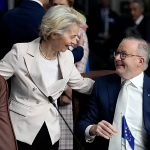European leaders must not become complacent, but instead, act decisively and renew their commitments to support Ukraine in its fight against Russia’s invasion, according to author Viktor Mak. The initial international support for Ukraine has begun to wane, with competing priorities leading to a slow dilution of commitments. Therefore, it is crucial that European leaders step up their efforts to help Ukraine effectively push back against its aggressor.
The impacts of the war in Ukraine have deepened over the two years since Russia’s invasion, with millions of internally displaced people struggling to make ends meet. This societal disruption calls for not only extensive military assistance but also support for the basic needs of the population. Despite uncertain government support, initiatives like the UNITED24 platform have been successful in collecting donations to provide essential resources for those affected by the conflict, including body armor, uniforms, drones, and medical equipment.
In addition to individual and civil society efforts, smaller organizations in Europe have also made significant contributions to support Ukraine. Groups like Vitsche in Germany and Project HOPE in Poland have initiated campaigns to provide emergency medical units, transport services, and mental health support to Ukrainian refugees, showing solidarity across borders in times of crisis. These grassroots initiatives supplement government-level aid efforts and demonstrate the power of collective action in addressing urgent needs.
Even in countries like Hungary, where the government’s alignment with the Kremlin poses challenges, civic organizations have stepped up to provide aid to Ukraine. The “10 million trees” NGO in Hungary, for example, organized a campaign to deliver vital provisions to frontline workers in Ukraine, defying state media criticism and highlighting the importance of citizen-led initiatives in supporting vulnerable populations. These acts of solidarity underscore the resilience and compassion of European communities in the face of adversity.
The ongoing conflict in Ukraine reflects the broader struggle for sovereignty and self-determination in Europe, prompting calls for European leaders to uphold their promises of support to Ukraine. As historian Timothy Snyder has emphasized, maintaining solidarity with Ukraine is not only crucial for its defense against Russian aggression but also essential for preserving peace and stability in the region. By prioritizing renewed commitments to Ukraine and leveraging collective resources, European leaders can demonstrate their unwavering support for a free and sovereign Ukraine.
In conclusion, the need for international support for Ukraine remains urgent as the conflict continues to take a toll on the country’s population. European leaders must resist complacency and take decisive action to bolster aid efforts and ensure Ukraine’s ability to defend itself against Russian aggression. By reinforcing commitments to Ukraine and fostering cross-border solidarity, European countries can uphold their values of democracy, peace, and human rights, standing united in the face of adversity and supporting those in need during challenging times.










